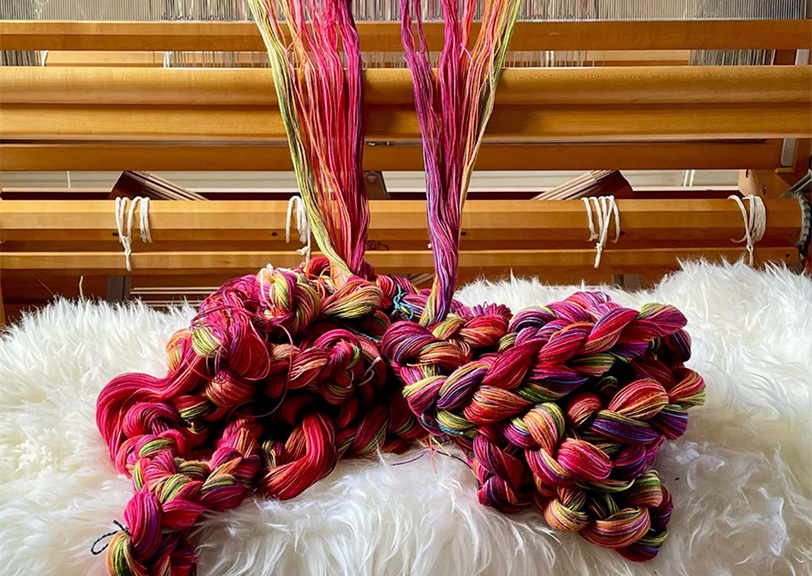ENTER YOUR EMAIL TO RECEIVE OUR WEEKLY NEWSLETTER
Don’t Retire—Reboot, Part 1
How many women 60 plus are finding ingenious ways of carving out new and satisfying livelihoods.
By Linda Dyett
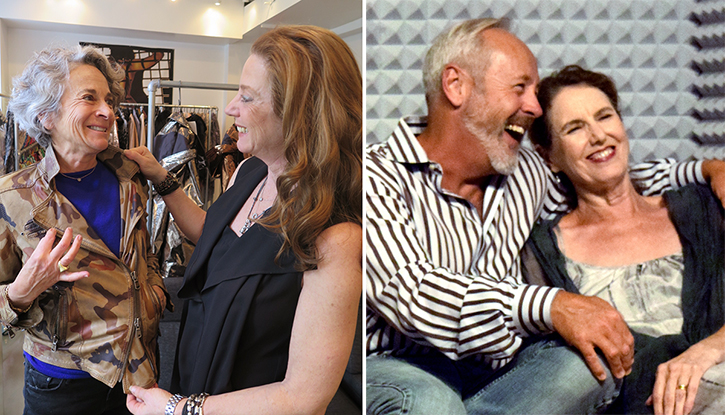
Roving retailer Aline Sosne, on the job with Patricia Oppenheimer, co-owner of the X’Tige Showroom; recently minted actress Cass Collins, taking a break with her co-star John Higgins in “A Tender Thing”—a Romeo and Juliet with the doomed lovers re-imagined as senior citizens.
. . . . . . . . . . . .
Career reinvention? That’s something we expect of Millennials as they scramble to join the increasingly challenging workforce. But twenty-somethings aren’t the only job seekers these days. Many women in their sixties and seventies—the first generation who didn’t just hold down jobs, but had meaningful careers—are finding ingenious ways of revamping, carving out new livelihoods, fulfilling long-held passions, and remaining relevant in the skittish 21st century job market.
Sure, plenty of sixty-plus women are happily using retirement to travel or go skydiving. But many others are choosing to remain in the work force, often creating new niches for themselves. Why retire when so many of us are healthier and more energetic than our mothers or grandmothers were at our age? After all, we’re the generation who ushered in the mold-breaking late ’60s social and cultural upheavals known as Youthquake. We’re hard-wired not to retreat into obsolescence.
“It was now or never,” says a retired social worker who fulfilled a lifelong dream by joining a Mayan archaeological dig in Belize.
“I don’t want to lose my edge; I want to remain relevant,” says a former litigator who now works for a legal aid organization.
“It took me 40 years to build up my expertise. Why let that go to waste? And besides, I love my work,” adds a retired special education teacher who now runs a tutoring service.
Even armed with the benefits of Social Security and pensions, legions of us need to bolster our income—as evidenced by the scores of senior women who are driving for Uber and stocking shelves at Trader Joe’s. Not that income from our retirement jobs typically matches our previous earnings. We live in equal inopportunity times.
Of course it’s no easy task combating rampant ageism—but it’s do-able. In fact, for a lot of over-sixty women, the challenge to prove ourselves is resulting in numerous unexpected, inspired, and fulfilling ways of reigniting our careers. Here are the stories of two New York-area women who have accomplished just that:
Aline Sosne
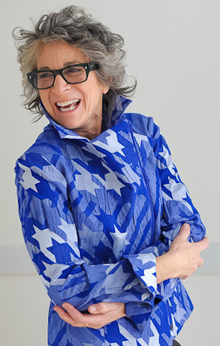
After 35 years as a lionized fashion boutique owner, Aline Sosne closed up shop—permanently, though not for long. Visionaries like her are bound to resurface, and she did—as a roving retailer, or a wholesale-retail liaison, as she calls it. But unlike other former bricks-and-mortar shopkeepers, who switched to selling their wares on the web because their brick and mortar stores were too expensive to maintain, Sosne has scarcely any internet presence. Instead, she now escorts her loyal customers—women fifty-plus, who were born with a gene for shopping and a taste for unconventional luxury—to sales-generating champagne parties that she arranges at designer showrooms.
There, not only do her customers socialize and sip—they trawl the latest collections before they hit the stores. And all the while Sosne does what she’s always done: she styles each woman’s wardrobe, recommending this sweater, tied with that scarf, worn with these pants and those shoes. Her customers can also place special orders for a new lining, another color, and different details. How timely in our 21st century service-oriented retail culture.
Raised in Oceanside, Long Island, Aline Berger received an M.A. in Cinema Studies at NYU, where she met her first husband, Jeff Sosne, a law student. In 1972, they abandoned city life and moved to the Berkshires, where Jeff embarked on a law practice in Lenox, Massachusetts. Ten years later, after their two sons had started school, Sosne opened a yarn shop and named it Tanglewool—a riff on Tanglewood, the Boston Symphony Orchestra’s nearby summer home. With the ’80s knitting craze in full swing, her store became an immediate success, frequented by locals and vacationers alike.
Gradually, Sosne began stocking ready-made knits, which became so successful that in 1990 she transitioned Tanglewool into a clothing boutique. Her stock in trade? Boho-chic, edgy-eclectic, Asian-inspired, comfortably oversize styles that were utterly different from the crafts-y fare found in typical New England country clothing stores. Just about everything was hand-picked on European scouting trips: knitwear from Patricia Roberts and La Fee Parisienne; designer pieces from Issey Miyake, Yohji Yamamoto, Brunello Cucinelli, Sylvie Schimmel, Christensen Leather, Rundhols and Oska; offbeat street shoes from Marsell, Philippe Model and Trippen.
With her film-school visual sensibility intact, Sosne merchandised her gallery-like space into a scintillating salon that attracted legions of loyal customers. Their typical comment when first encountering the store? Whoa—I was not expecting such serious shopping…and there they lingered for the rest of the day, chatting and getting their wardrobe pulled together by the ever-charismatic Sosne. Some of these women—the ones who remain her customers today—were A-list New York arts, professional, media, and entertainment industry types, who had Berkshire summer homes, or were visiting Tanglewood, or were guests at nearby Canyon Ranch. (Sosne fondly recalls many Canyon Ranch regulars checking in at Tanglewool before they checked in at the spa.)
In 2011, her husband Jeff suddenly died of a massive cerebral hemorrhage. Though shocked and grief-stricken, Sosne remained on the job, “deriving strength and spirit from my staff, my customers—all my associates.” That kept her going.
In 2013, she embarked on what she describes as “her first new romance in 40 million years”—with Clemens Loew, a divorced psychotherapist and the father of one of her customers. Co-founder and co-director of the National Institute of Psychotherapies, Clemens was based in New York City, where Sosne’s two recently wed sons were living. She began spending more time in the city. In 2015, after she and Clemens married, she closed up shop and relocated to the Upper West Side.
Her customers and vendors reacted with mixed emotions. “They were happy for me, but sad to lose the store,” she explains. In fact, some vendors implored her to escort her New York customers (themselves eager for Sosne’s continued styling magic) to their showrooms for shopping trips. Customers would pay the vendors directly, who would then send Sosne commissions.
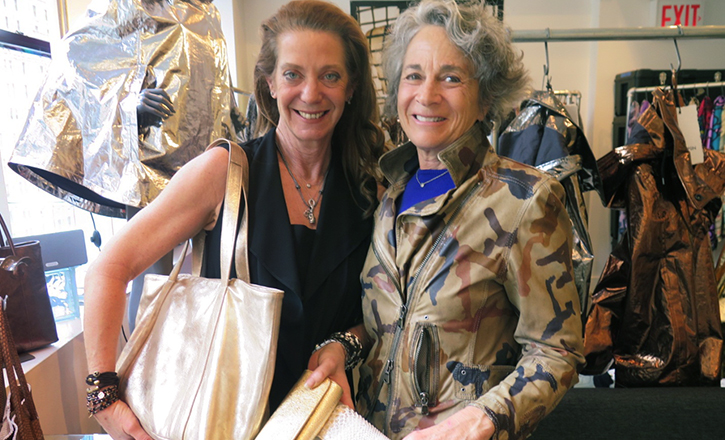
Aline Sosne and Patricia Oppenheimer.
. . . . . . . . . . . .
She went for it, marking the start of Phase 2 of her retail career. Financially, “it’s a blip on my radar, compared with my previous business,” Sosne allows. Yet it’s proven so successful that she called on a Tanglewool associate and dear friend to serve as her second-in-command. It’s also been a win-win situation for the vendors. One showroom, which specializes in oversized Italian cashmere, had been losing retailers skittish about selling handknits that cost thousands of dollars. Sosne’s customers proved more amenable.
Another vendor, the multi-line X’tige Showroom, holds a distinct lure for Sosne. Filled with luxury artisanal designer clothing and accessories culled from all over the world, it allows her to pick and choose from a wide variety of items for her customers, almost as if it were a retail boutique. Its quintessential motorcycle jackets in leathers, suedes, and shearlings, its mini-handbags, grommeted boots, and spangled jewelry have given Sosne the wherewithal to perform the on-the-spot, head-to-toe fashion styling in which she excels. So who needs bricks and mortar? Indeed, store sales are waning everywhere. You read it here first: This could well be the start of a whole new direction in fashion retailing.
Aline Sosne can be reached at asosne42@gmail.com.
. . . . . . . . . . . .
You may enjoy other NYCitywoman articles in this series by Linda Dyett: Don’t Retire—Reboot, Part 2; and Don’t Retire—Reboot, Part 3.
. . . . . . . . . . . .
Cass Collins
 She had multiple and sometimes simultaneous livelihoods: account manager at a succession of advertising agencies…proprietor of a community play group…columnist at a community newspaper. But the career that Cass Collins dreamed of as a child—stage acting—evaded her for decades, until she finally auditioned and became a full-fledged stage actor whose roles have already won her the Theater Association of New York State’s Excellence in Acting and Outstanding Performance awards.
She had multiple and sometimes simultaneous livelihoods: account manager at a succession of advertising agencies…proprietor of a community play group…columnist at a community newspaper. But the career that Cass Collins dreamed of as a child—stage acting—evaded her for decades, until she finally auditioned and became a full-fledged stage actor whose roles have already won her the Theater Association of New York State’s Excellence in Acting and Outstanding Performance awards.
What inspired her thespian bug? Maybe it’s genetic. Collins’s biological father was an actor, though long estranged from her family. “Maybe acting is my way of keeping him close,” she proposes. “Too Freudian? Ya!”
But Collins certainly hammed it up as a child. “We used to listen to sound tracks of plays like The Nervous Set, The Fantasticks, Gigi, and Oklahoma! She remembers belting out I’m just a girl who cain’t say No! in her pajamas in the Upper West Side apartment where she grew up. Her family life, she says, was “raucous,” but it served her well; she eventually drew on it to prepare for her favorite role, the outspoken Martha in Who’s Afraid of Virginia Woolf?
Collins got a BFA in acting at Emerson College in Boston, but found it “completely useless.” So back in New York, she went for “a real job,” becoming an account manager at a series of high-level advertising agencies—N.W. Ayer, Burson-Marsteller, and the boutique firm Lord, Geller, where she served as a vice president. For 12 years, she dealt with such heavy-duty clients as AT&T, WNBC-TV, The New Yorker magazine, Fuji, and JVC. Back then, Collins had the distinction of being one of the few women managers in the burgeoning consumer video field.
It was during her time at Lord, Geller that Collins married a man with his own varied career: Jim Stratton, UPI reporter, Democratic district leader, loft columnist for the SoHo Weekly News and TriBeCa Trib, and saloon keeper, among other jobs.
In 1987, when Lord, Geller was bought out by a British firm, Collins promptly resigned and soon afterwards embarked on two completely new ventures. The first was co-running a community play group in her Tribeca loft—a job she loved. It lasted for 12 years, ending in the wake of 9/11, with the World Trade Center just blocks away.
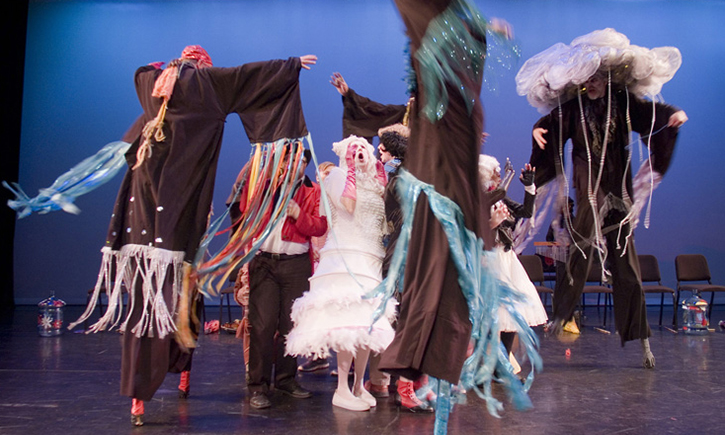
A scene from The Weather Project (a climate change dramatization), with Cass Collins in the center, playing Queen Cumulus.
. . . . . . . . . . . .
Her second job was—and still is—writing a column called River Muse for The River Reporter, an award-winning Upper Delaware River Valley newspaper. Subject? Part-time life in her second home, in Narrowsburg, a tiny arts village in Sullivan County.
It was in The River Reporter that Collins saw an audition notice for Virginia Woolf, being produced by the Sullivan County Dramatic Workshop, a regional collaborative theater company in South Fallsburg. The play was one of her favorites, so she felt emboldened to go for a tryout. Her husband predicted she’d get the part. She did.
“It proved rewarding on so many levels. I realized it was what I’d always wanted to do,” says the feisty Collins, who’s taken acting classes, checks Backstage.com for casting calls, and works with a business manager. She’s also getting roles in New York City, as well as upstate, so she regularly commutes between her Prospect Heights apartment and Narrowsburg, always taking slow, scenic Route 97 along the Delaware River, using driving time to learn her lines.
To date, Cass Collins has appeared in 16 stage plays—an admirable record, especially considering that her acting career began decades later than most. Under Milk Wood, Waiting for Godot, Steel Magnolias, and a dramatization of The Four Quartets are some of the productions she’s been in. Her most recent role was Juliet, as in Romeo and Juliet—an altered version thereof, with the doomed lovers re-imagined in old age, giving Shakespeare’s verses a new meaning (Yes, even in her sixties Collins gets to play Juliet! The girl can’t help it.)
Her late-breaking career suggests unique advantages found outside the traditional ingénue age brackets. “I certainly feel more liberated,” Collins told Backstage.com in a 2011 interview. “Somehow, [the audition process] isn’t as tortuous at this stage in my life as it was in my twenties. I’m in a pool with women who know who they are, know what they look like, know what they can do, and we’re comfortable with that. And the camaraderie that I’ve encountered is really refreshing. Even in large auditions, we sort of have a knowing glance at each other and wish each other luck. It’s a whole different experience.”
The ever-spunky Collins also admits that most of her parts have been “playing eccentric women.” But the girl who couldn’t say No remains “open to doing anything.” While her take-home pay is “less than minimum—that’s for sure,” she’s in it for the long haul (with her husband’s financial support). What she’d relish most is playing Virginia Wolff’s Martha again. “For all her shrill meanness, I see a little girl without a mother, and I really love her.”
Cass Collins’s manager, Ann Lurie Berlin, at Fiddleheads, Ltd., has sent her on movie auditions, “where I thought I kicked butt—yet did not land anything. It’s hard, I think, taking a chance on an unknown talent.” More experience, more exposure—might they help? All in good time.
. . . . . . . . . . . .
HAVE YOU REINVENTED YOURSELF? We have posted several articles on women who reinvent themselves after age fifty or sixty. Now we’re hoping to publish more profiles of sixty-plus women in the greater New York City area who have restructured or reinvigorated their careers. If you have similar experiences and would like to be interviewed, or if you have a friend who does, please contact Linda Dyett at LDyett@nyc.rr.com.
. . . . . . . . . . . .
Linda Dyett’s articles on fashion, beauty, health, home design, and architecture have appeared in The New York Times, Washington Post, Monocle, Afar, New York magazine, Allure, Travel & Leisure, and many other publications.



